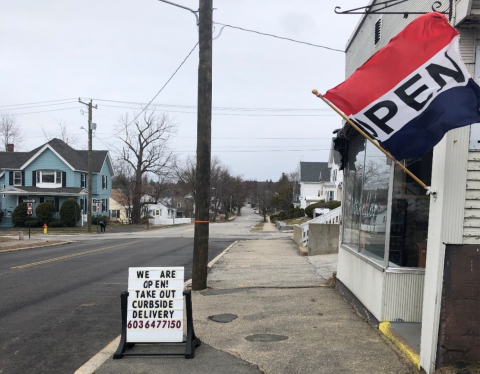10 Creative Ways Businesses are Serving Customers during Crisis
SHARE

Many communities with small businesses across the country and our state are dealing with new challenges due to the COVID-19 global pandemic. Small businesses take great pride in their communities and provide essential and valuable services. Recognizing this difficult time, we are also witnessing some very creative and innovative solutions, with small businesses essentially adapting overnight across New Hampshire. Here are 10 ways some communities and businesses are adapting:
- Developing or Enhancing an Online Strategy – Many businesses have adapted by offering eGift Cards, increasing their social media presence, working with other businesses to do a virtual craft fair, and FaceTiming their customers for a personal shopping/curbside pickup experience. Some companies, like Lightspeed, are offering free services to small businesses to allow them to transition to selling online.
- Joining a Database of Open Businesses: Many communities and chambers of commerce are supporting their local businesses by keeping updated lists of open businesses and services. The NH Business Review is also maintaining a statewide list of restaurants found here.
- Reaching out to Customers – Using social media or existing customer listservs, businesses are reaching out to their loyal customers to update them on their status and ways they can be supported. For more information, check out Small Biz Guide from Teatotaller.
- Utilizing Delivery Services – Nowadays, there is an abundance of delivery services that businesses can use to get items from a store or restaurant to customers. Everything from groceries, antiques, to local farm goods can make their way from the store shelves to the doorstep without contact.
- Pivoting Types of Items Sold – Businesses are filling gaps in the emergency response by developing or adapting products or services, such as converting equipment to produce PPE, providing meals and supplies for first line responders. Distilleries have shifted from making spirits to sanitizer, designers are making face masks, and local farm collectives switched to offer not just fresh produce and locally made food but to prepared foods and home delivery.
- Shifting from In-person to Online Classrooms — Fitness studios, children’s art classes and other classes can be taught virtually providing much needed exercise, entertainment and stimulation for people of all ages. There are many software programs businesses can use to still reach customers and students.
- Creating Meal Kits – To move their perishable items, some restaurants are selling their raw ingredients as meal kits that people can make while self-isolating at home. For example, making a pizza from the dough, sauce and cheese at your local pizza joint can be a fun activity for small children, while also supporting a local business. For the more adult audience, bars are selling drink mixes without the alcohol.
- Participating in a Love Chain – Some communities and groups of businesses are working together to encourage customers to share gift cards to local businesses with friends and then pass it on. Doing this can help pay it forward for your local economy.
- Placing Signs Outside Business - Some restaurants are keeping it simple and posting signs outside announcing they are open for take-out. Other businesses have signs outside to call a certain number and they will deliver to your car.
- Running Contests – Several organizations and chambers of commerce are sponsoring contests encouraging people to get takeout, delivery, or do curbside pickup from local businesses. Customers can take photos showing they’ve made a purchase and can be entered to win a gift card to a local business.
During these difficult times, adapting to the circumstances and being creative can be so impactful for communities and local economies.

